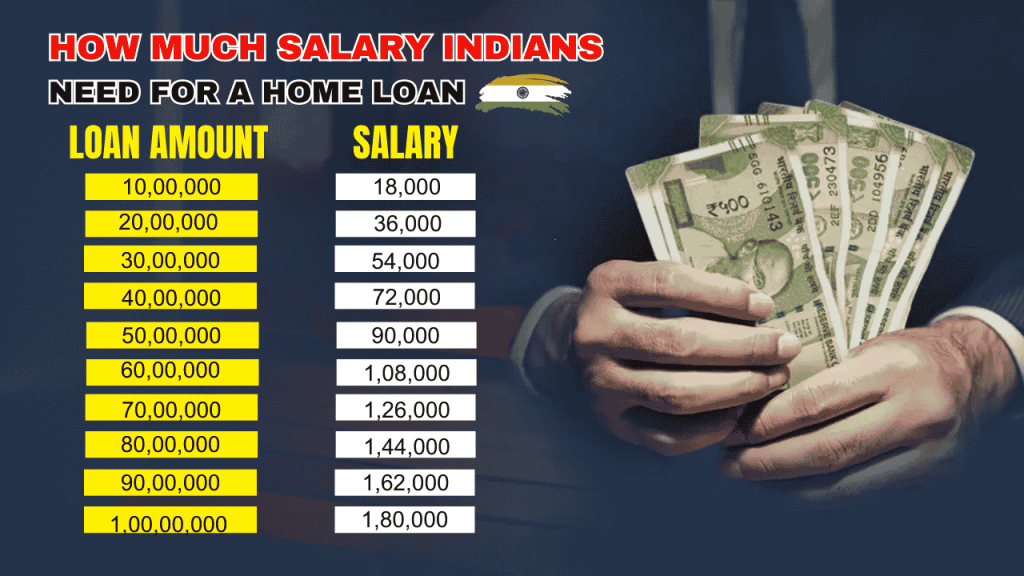
For most Indians, buying a house is one of the biggest goals in life. Whether a small flat in the city or a cozy home in your hometown, owning a house gives us a sense of security and pride. But let’s be honest—homes are expensive. And to buy one, most people take a home loan from a bank.
Now the big question is: how much salary do you need to get a home loan? This is exactly what this article will help you understand and clearly.
What Is a Home Loan?
A home loan is money that a bank or financial company lends you to buy a house. You agree to pay back this amount in smaller parts every month. These payments are called EMIs (Equated Monthly Installments). Banks give loans based on how much you earn each month. The higher your income, the bigger the loan you can get.
Salary vs Loan Amount – A Simple Breakdown
Let’s look at a helpful chart that shows how much monthly salary you need for different loan amounts:
| Loan Amount | Monthly Salary Needed |
|---|---|
| ₹10,00,000 | ₹18,000 |
| ₹20,00,000 | ₹36,000 |
| ₹30,00,000 | ₹54,000 |
| ₹40,00,000 | ₹72,000 |
| ₹50,00,000 | ₹90,000 |
| ₹60,00,000 | ₹1,08,000 |
| ₹70,00,000 | ₹1,26,000 |
| ₹80,00,000 | ₹1,44,000 |
| ₹90,00,000 | ₹1,62,000 |
| ₹1,00,00,000 | ₹1,80,000 |
This means if your salary is ₹36,000 per month, you could qualify for a ₹20 lakh loan. If you earn ₹1.8 lakh per month, you can go for a ₹1 crore loan.
Why Does Your Salary Matter?
Banks and financial institutions want to be sure that you can repay the loan without any trouble. Usually, banks allow your EMI to be around 40% to 50% of your monthly income. The rest of your salary is expected to cover your regular expenses like groceries, travel, bills, and savings.
For example:
- If your salary is ₹50,000, your EMI should not be more than ₹20,000–₹25,000.
- If you want a loan with a higher EMI, your salary needs to be higher.
So, salary acts as a safety measure. It tells the bank how much you can handle without falling into financial stress.
Other Factors That Matter
While salary is important, it’s not the only thing banks look at. Here are a few more things that affect your home loan:
1. Credit Score
Your credit score is like your financial report card. It shows how well you have managed loans or credit cards in the past. A score above 750 is considered good.
2. Job Stability
Banks feel more confident if you have been working at the same place for a few years. A stable job means a steady income, which is a good sign for repayment.
3. Existing Loans
Already paying EMIs for a car or personal loan? That could lower your loan eligibility. The more loans you have, the more it affects your ability to repay another one.
4. Age
Younger applicants get longer loan tenures, sometimes up to 30 years. This means lower EMIs. Older applicants might get shorter tenures, so EMIs can be higher.

Down Payment – Your First Step
When you take a home loan, you don’t get 100% of the house value. Banks usually give 75% to 90% of the total cost. The rest, you need to pay yourself. This is called the down payment.
Let’s say your house costs ₹50 lakh:
- The bank may give you ₹40 lakh as a loan (80%).
- You’ll need to pay ₹10 lakh from your pocket.
So, always plan for this upfront cost before applying for a home loan.
Tips to Boost Your Loan Eligibility
Want a higher loan amount? Here are a few smart things you can do:
- Add a co-applicant (like your spouse or parent) if they have a regular income.
- Pay off existing loans to reduce your debt burden.
- Choose a longer loan tenure to reduce your EMI amount.
- Improve your credit score by paying bills and EMIs on time.
Final Thoughts
Getting a home loan in India depends a lot on your monthly income. The better your salary and financial habits, the higher your chances of getting a big loan. But remember, just because you are eligible for a high loan doesn’t mean you should stretch your budget too much.
A home is a big dream, but it should also be a comfortable one. Plan your finances well, compare home loan offers from different banks, and make sure your EMI fits easily into your monthly budget.
So, whether you’re dreaming of a cozy 1 BHK or a spacious 3 BHK, start with understanding how much loan you can afford—and the salary you need for it. With smart planning, that dream home might be closer than you think!
Suneel Yadav is a passionate writer known for captivating stories that blend imagination and reality. Inspired by travel, history, and everyday moments, Pari crafts narratives that resonate deeply with readers.

